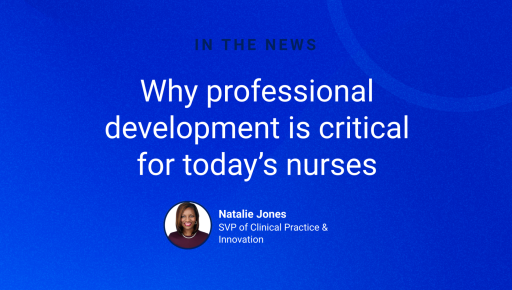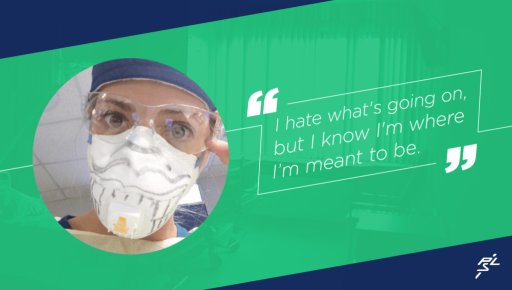By Dr. Marjorie Quint-Bouzid, DPA, RN, NEA-BC
EVP, Chief Nurse Executive, Kaleida Health
As a nurse executive, I’ve witnessed the evolution of nursing leadership—and the growing gap in competence that’s emerged as we promote emerging nurses into leadership roles without sufficient support. In a fast-paced, high-stakes industry like healthcare, leadership readiness is not just a nice-to-have; it’s essential. Yet many nurse leaders step into these critical roles without fully developed experience or formal training, often because the system demands quick advancement rather than deliberate development.
The truth is nurse managers remain one of the top contributors to frontline staff turnover. Proper support for our nurse leaders is needed now more than ever. In the absence of this, we set the stage for disillusionment, burnout, and a ripple effect of instability across the team. For younger generations stepping into these roles, often with limited leadership exposure, the learning curve is steep and can be unforgiving.
I’ve been there. In my own career, I have faced adversity in which I felt like I was failing because of a lack of preparation for a leadership role, not once, but twice. In hindsight, I realize that I needed the proper tools or experience to handle those difficult situations, and unfortunately, I’m far from the only nurse who was thrown into the deep end and asked to swim. I persevered, sought out training and development on my own, and returned to a leadership role for good. But some of the nurses who joined me in the deep end weren’t as resourceful, and I don’t believe that’s their fault.
Now more than ever, we need to rethink how we prepare and empower nurse leaders. We must accelerate leadership development while ensuring that competence and confidence grow in tandem. Leadership is more than a title. It’s about leading others effectively, especially during times of stress and uncertainty. And when it comes to healthcare leadership, specifically in nursing, there is a plethora of unique circumstances and challenges that simply don’t exist in other professions. In short, it’s time to prepare our nurses like nurses.
Challenges in Leadership Competency
In this age of nurse shortages and increased demand, the challenges in nursing leadership competency are layered and complex. First and foremost, we’re seeing more rapid role advancement in the nursing profession. Clinical excellence often leads to promotion, but clinical skills do not automatically equate to leadership ability. Just because someone is an exceptional nurse doesn’t mean they’re prepared to manage people, budgets, or systemic change. And yet, we continue to push nurses into leadership roles with minimal preparation.
Worse, there is a lack of leadership training tailored to the actual demands nurse leaders face. I often see organizations implement one-size-fits-all leadership programs that miss the mark entirely. They’re not addressing the individualized needs of nurse leaders, who vary greatly in their learning styles, strengths, and gaps. Leadership, in my view, can be taught. But it needs to be taught intentionally using a multi-prong approach, including micro-learning, mentoring, and real-world problem-solving—not just through a generic training session.
Confidence and resilience gaps are also deeply concerning. Many emerging leaders doubt themselves. They question whether they belong in leadership, especially when challenges arise. I’ve been in conversations where I hear hesitation, self-blame, and even quiet desperation in their voices. This isn’t just about competence; it’s about identity. When leaders feel unsupported or ineffective, they often withdraw, become discouraged, or ultimately leave leadership altogether—like I once did. That loss of potential is tragic, and it’s preventable.
I believe we need to do a better job identifying emerging leaders earlier—yes, even at the charge nurse or staff nurse level. When I speak with the nurses on my team, I’m intentionally listening for leadership potential. I hear how they handle conflicts, how they take accountability, and how they support their team. I encourage other nurse leaders to listen to those seedlings of leadership when speaking with their teams. Because if we don’t nurture them, they never grow. And it’s on us to help the next generation bloom.
Role Modeling and Inspiring Future Leaders
One of the most powerful ways to accelerate leadership competency is through role modeling. As experienced leaders, we must lead by example, not just when things are going well, but especially when we’re navigating difficult decisions, ethical dilemmas, or team challenges. I often think about how young leaders watch us. They observe how we handle pressure, how we communicate, and how we recover from mistakes. That’s where real learning happens.
We also have to encourage growth mindsets. Mistakes and setbacks are inevitable, but they’re also incredible learning opportunities. Rather than punishing failure, we should be helping emerging leaders analyze what went wrong, what they learned, and how they’ll approach it differently next time. Confidence doesn’t come from getting it right the first time—it comes from learning how to recover, how to reflect, and how to keep going.
Beyond individual interactions, we must foster a culture of leadership across our organizations. Leadership development should not be a one-time seminar or an optional extra. It needs to be built into the fabric of our culture: Ongoing, embedded, and customized to the needs of each leader. And it needs to start well before someone steps into a formal leadership title. The best leaders I know were encouraged and mentored early in their careers, long before they ever imagined leading a unit or a department.
There’s also a misconception that leadership development is only about fixing poor communication or conflict resolution. That’s not the root issue. I’ve had leaders tell me they were sent to improve their communication, but their communication was fine—until stress and poor coping skills took hold. It’s not about what you say when everything’s calm; it’s how you manage yourself and your team when things fall apart. That’s the mark of a true leader, and it only comes through experience.
Call to Action: Training for Nurses, By Nurses
Leadership isn’t taught, it’s gained through hands-on experience and development. All leaders are managers, but not all managers are leaders. When nurses are put into a leadership role, they need real experience to draw from to be able to succeed.
We need to create structured pathways for leadership development, starting with mentoring, continuing through formal education, and supplemented by real-time coaching and reflection. We need to recognize that nurse leadership is a unique challenge that requires unique solutions to adequately prepare our clinicians for the job. No matter how much potential one has, if they’re not supported properly, they’ll feel as though they’ve been set up to fail. It’s a shame if more young, ambitious, talented nurses repeat my mistakes: rejecting the call to leadership when they clearly want and deserve that responsibility.
Now more than ever, we need nurse leaders who are prepared to soldier through uncertain and challenging times. But if we continue down the current path—promoting without preparing, expecting performance without support—we will lose talented leaders before they ever fully realize their potential.
We can do better. We must do better. The future of nursing depends on it.
To learn more about Prolink's clinical programs and meet our Clinical Team leaders, click below.









